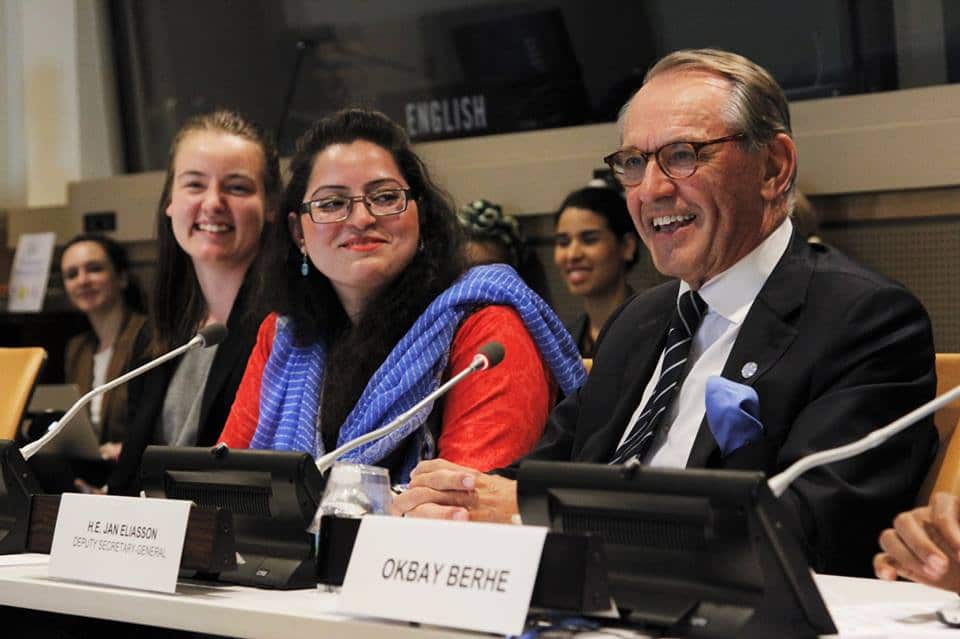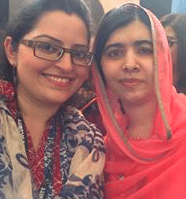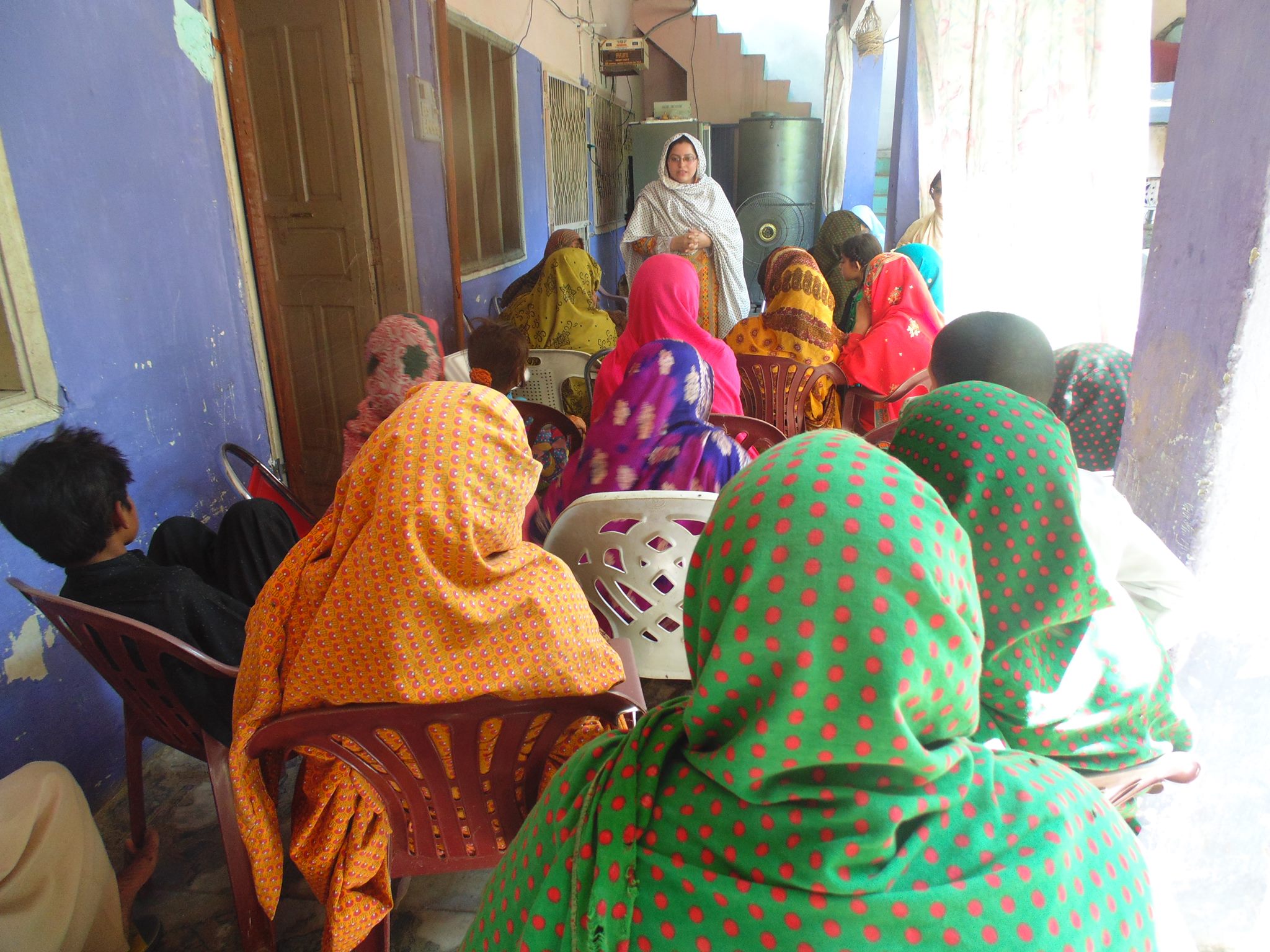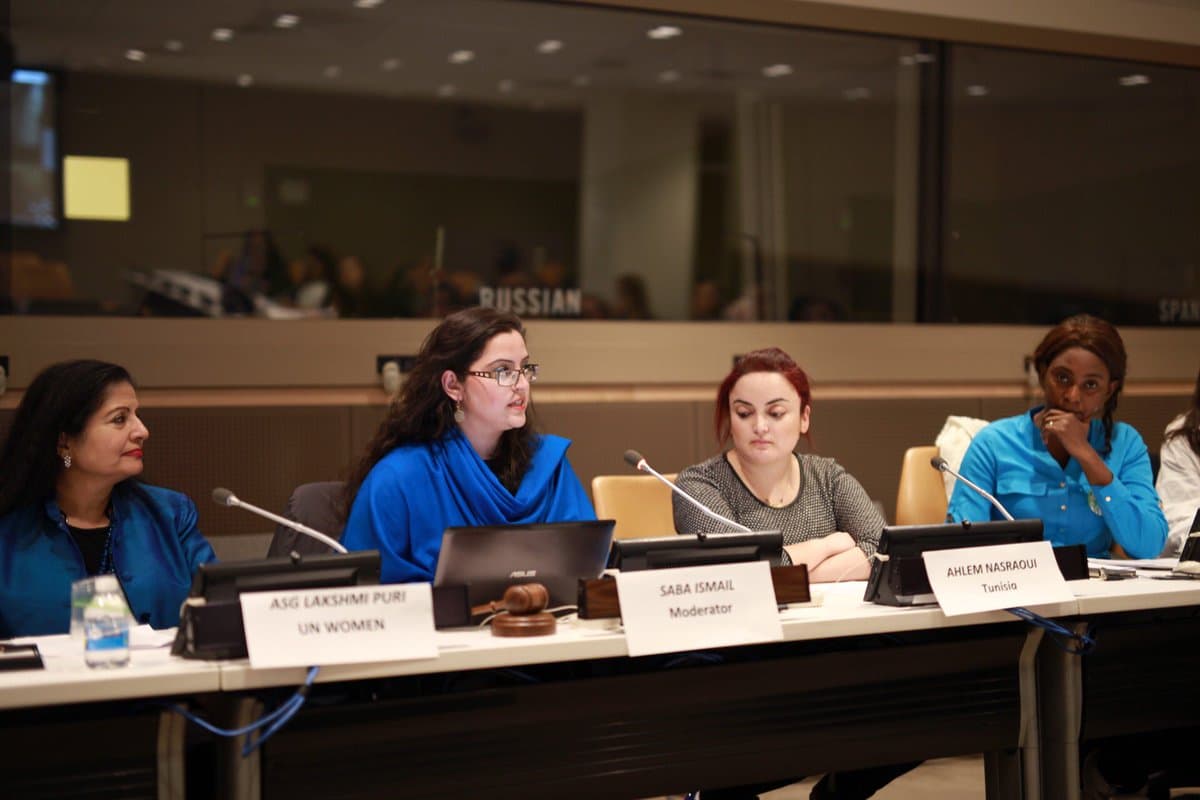
Saba Ismail (center) moderated a sessions at the UN with former UN Deputy Secretary General Jan Eliasson.
Aware Girls is a young women-led organization founded by Saba and Gulalai Ismail while they were 15 and 16 respectively. The sisters have been working tirelessly for women’s empowerment, gender equality, and peace in Pakistan.
In a country where there are almost 25 million children not attending school, of which most of them are girls, education is one of the most critical factors to realize political and economic progress for Pakistan.
Aware Girls helps strengthen the leadership capacity of young women enabling them to act as agents of social change. A great example is Aware Girls’ alumna, the youngest Nobel laureate, Malala Yousafzai.
Saba Ismail, co-founder and Executive Director of Aware Girls, spoke with impactmania about founding the organization while in her teens; the country’s honor killings and blasphemy laws; and her recent visit to the White House.
BY PAKSY PLACKIS-CHENG
Saba, you and your sister, Gulalai, founded Aware Girls in Pakistan when you were teenagers. Why start your own organization, why not join an established institution?
Yes, there are many organizations working for women’s rights, but the organizations all have very male-dominated culture and hardly any women leadership. For me, I wanted to do something about what I saw in my own environment. One day, I must have been the age of 12, my cousin who is almost my age, was told that she was not useful anymore. She had to leave school and was to get married. Our cousins were telling my sister and me, “You are very privileged, because you go to school.” We were in school because our parents’ mindset was different than most.
As little girls, my sister and I saw no places for women to work. Without the support of our father, we would not have been exposed to women who were in leadership positions. He introduced us to many women leaders such as the head of UNICEF at the time and a female Senator.
I understand that Malala Yousafzai, Nobel Peace Prize recipient, went through one of your education programs?
Yes, we have a long relationship with Malala Yousafzai and her father. Malala attended one of our programs for a year in 2011, before she was shot. In addition, Gulalai Ismail, the Chairperson of Aware Girls is the Gul Makai champion of the Malala Fund.
Sister of Saba, Gulalai, co-founder of Aware Girls on TedX: How can we encourage young Muslims to choose life, not violent jihad?
You were taught equality and exposed to women leaders, but how do you teach girls from households that do not necessarily agree with your views?
Initially, it was hard for people to accept a women-led organization. There are a lot of differences between what went on in our home, while outside we are all still part of a society where even brothers control their sisters. My sister and I started with volunteering and learning from other women’s organizations. I think things have changed a lot in the last years. Now, in our programs, we also involve men. There have been men who have said, “Could you please teach my sister” or fathers who have said, “We want to send our daughters to school.”
What would be the first steps to make an impact with respect to youth development in Pakistan?
Everyone thinks that lessons apply to other women, not to women in their own home. Changing the situation for your own family members has to be the first step. Anyone who wants to see change has to adopt what he or she teaches, instead of waiting for the rest of society to change. I think people are afraid to be different from others. They don’t stand up for what they want.
Then, people either don’t know about human rights’ laws or, when it comes to the implementation of the existing laws, think that it is the responsibility of the government or the police to implement them.
We actually have laws against sexual harassment, but we also need people to know about the laws and how to apply them. We do need laws on domestic violence, which is considered a family matter. It is considered honoring the family and the woman by keeping a woman inside the house. You are considered a good woman if you are a great cook and stay in the house caring for your husband and in-laws. That also needs to change.
Do you see a changed mindset with the next generation of boys? Or are the ideas and values still transferred from one generation to another without much thought?
Things are changing in Pakistan. It is partly because of social media. Also, some radio and television programs and print media are shaking things up by talking about it.
I know there are many challenges, especially violence against women. The extremist groups are a very big challenge to women’s rights. On the other hand, I have seen a lot of progress. Now the younger generation will talk about these issues. We actually engage conversations with young boys. I’m very hopeful, actually.
That is great because we always talk about women groups, but if women groups don’t have an exchange with boys, what is really going to change, right?
Yes, we organized speech competitions at boys’ colleges. We had teams that talked about advanced commitments. One of the ninth-grade boys said, “We never knew our sister also has rights just like us.”
So once there was this realization, things can change. Another boy said, “I am going to talk with my parents and I am going to ask them to offer the inheritance to my sister too.”
You and I were at the United Nations when Malala’s father spoke. Your father is also a professor and an activist and had tremendous influence on his daughter. How do we educate more men to be supportive of their wives, daughters, and women’s rights in general?
It’s a very interesting question. There are many girls and women who have received a lot of recognition in and outside of Pakistan and most of them have had fathers who have had a huge role and impact. I would say that all the fathers have educational backgrounds. Malala’s father is a teacher, so is mine. But still, they’re in this society that is very different. And like you were saying, most boys are not trying to be mean, right? They were just not exposed to any other thoughts than this is the way it is.

Saba with Nobel Laureate and friend Malala at Malala’s appointment as Messenger of Peace.
They were not brought up thinking that girls and boys are equal. Apart from education, how did men like your father, against society’s norm, remain strong in their support of their daughters?
My father was only 15 years old when his father died. He studied a lot by himself and he was very active in student politics. His rights were violated many times by extremist religious group. His life story is that he had to resist, resist, resist, and resist.
Back in the 1990s, my father founded an organization working on gender equality and women’s economic empowerment. There were these religious extremist groups who pressured him to stop his work, but he did not stop. After that, there were a lot of campaigns against my father. Often he was restricted from entering into some parts of the country. He was in prison for almost two months, for helping others. He felt more and more that he was not the only one whose rights were violated. It kept him in the fight for human rights and democracy.
How has your father influenced you?
When I was in school, there was a booklet about the constitution of my country. There were also stories about international human rights. My father would sit me down and we would discuss, “What is even a constitution?” He would give me and my siblings time to memorize the constitution and asked us to debate the issue. Then, he would give a test.
At one point, I saw a movie done by UNICEF. There were stories of an actual family: grandparents, parents, and two siblings, a brother and a sister. The movie was made to teach kids the concept of gender equality. One story was about food distribution. The father brought home a mango and the grandmother said, “The boy gets to eat the mango.” Another story was about the boy doing household chores.
I was taught that things should be different. My father would ask my brother to clean the house. At one point, even my brothers would learn how to cook. When our extended family would visit our home, they were very surprised. One time, my cousins were over and my mother asked my brother to bring something from the kitchen. For my cousins, it was not appropriate for a boy to do household chores. In the end, my extended family embraced it; but it took work and time to even educate our own family.

Saba Ismail speaking at a local community.
Apart from changing people’s mindset, what needs to happen for girls to receive education?
With the support of the Malala fund, we did research in a number of communities. When we talked with parents, we found out that they weren’t sending their girls to school because they were afraid of harassment when their girls would go out. So they had to consider, what is the priority for my daughters? Is it education or is it safety?
Now they are safe, but they are not educated. What we need is to have schools that are accessible to the community. They can’t be so far that no one can get to them. And, they must provide trained women teachers who teach gender equality, not reinforce it. Even things like proper, clean toilets are needed to ensure girls can go to school.
How can people support peace for the young people in Pakistan?
Speak up against injustice and accept the diversity of Pakistan; stop putting people in boxes based on their religious identities. The blasphemy laws in Pakistan have been misused against Muslims, Ahmadis, and Christians. A young student, Mashal Khan, was accused of blasphemy and lynched by his fellow students. This needs to be stopped — completely and immediately.
What’s next?
I had meetings in the White House and at the U.S. State Department where I was advocating for the importance of locally led peacebuilding initiatives and consulting local people while deciding any policy for the country. I shared that I am working to create an environment where there is no space for violent ideologies.

Saba Ismail moderating a UN Women Panel on Women Peace and Security in New York, NY.
Give me an example of how you create an environment where you dissuade young people pursuing violent avenues.
To dissuade young people from joining militant groups, I started a network of young people known as the Youth Peace Network, which aims to prevent and counter violent extremism. We empower them by creating an environment and ways they can engage in the civic and political processes.
Specifically, we use a peer-to-peer education model in which young people reach out to other young people who are vulnerable to the violent ideologies and provide them with alternative narratives based on non-violence, tolerance, compassion and pluralism. On a daily basis, we are showing that young people are not troublemakers, perpetrators, or even victims, but actually important actors in preventing violent extremism. We are building peace.

